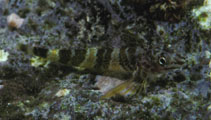| Family: |
Tripterygiidae (Triplefin blennies), subfamily: Tripterygiinae |
| Max. size: |
2.7 cm SL (male/unsexed) |
| Environment: |
demersal; marine; depth range 1 - 8 m |
| Distribution: |
Western Central Pacific. |
| Diagnosis: |
Dorsal spines (total): 14-18; Dorsal soft rays (total): 7-11; Anal spines: 1-1; Anal soft rays: 15-20. Male blackish on fins and anterior three-fourths of body , and yellow caudal-fin with median black band. Female yellowish with 3 broad, greyish double bars divided by thin grey line, broad black bar at base of caudal-fin, and greyish head with brown markings. Head, chest, and pectoral-fin base scaleless; long and slender orbital tentacle; mandibular pores 3-4 + 3-4 + 3-4. Maximum size to 3.2 cm TL (Ref. 90102). |
| Biology: |
Adults are found in coral and rocky reefs (Ref. 90102). Eggs are hemispherical and covered with numerous sticky threads that anchor them in the algae on the nesting sites (Ref. 240). Larvae are planktonic which occur primarily in shallow, nearshore waters (Ref. 94114). Feeds on small benthic invertebrates (Ref. 89972). |
| IUCN Red List Status: |
Least Concern (LC); Date assessed: 03 May 2010 Ref. (130435)
|
| Threat to humans: |
harmless |
Source and more info: www.fishbase.org. For personal, classroom, and other internal use only. Not for publication.

